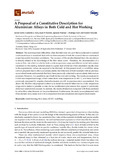Mostrar el registro sencillo del ítem
A proposal of a constitutive description for aluminium alloys in both cold and hot working
| dc.creator | León Iriarte, Javier | es_ES |
| dc.creator | Luis Pérez, Carmelo | es_ES |
| dc.creator | Fuertes Bonel, Juan Pablo | es_ES |
| dc.creator | Puertas Arbizu, Ignacio | es_ES |
| dc.creator | Luri Irigoyen, Rodrigo | es_ES |
| dc.creator | Salcedo Pérez, Daniel | es_ES |
| dc.date.accessioned | 2017-10-30T11:14:38Z | |
| dc.date.available | 2017-10-30T11:14:38Z | |
| dc.date.issued | 2016 | |
| dc.identifier.issn | 2075-4701 (Electronic) | |
| dc.identifier.uri | https://hdl.handle.net/2454/26070 | |
| dc.description.abstract | The most important difficulties when the behaviour of a part that is subjected to external mechanical forces is simulated deal with the determination of both the material thermo-mechanical properties and its boundary conditions. The accuracy of the results obtained from the simulation is directly related to the knowledge of the flow stress curve. Therefore, the determination of a material flow rule which is valid for both a wide temperature range and different initial deformation conditions in the starting material presents a great deal of interest when simulation results close to the experimental values are required to be obtained. In this present study, a novel flow stress curve is proposed that is able to accurately predict the behaviour of both materials with no previous accumulated strain and materials that have been previously subjected to severe plastic deformation processes. Moreover, it is possible to use it both for hot and cold working. The results are analysed in a wide test temperature range, which varies from room temperature to 300 °C, and from material previously processed by angular channel extrusion or with no previous strain accumulated. It is shown that the flow rule proposed is effective to model the material behaviour in a wide temperature range and it makes it possible to take the recrystallization phenomena that appear in previously deformed materials into account. In addition, the results obtained are compared with those predicted by other flow rules that exist in the prior literature. Furthermore, the study is complemented with finite element simulations and with a comparison between simulation and experimental results. | en |
| dc.description.sponsorship | The authors acknowledge the support given by the Spanish Ministry of Economy and Competitiveness under the research project DPI2013-41954-P. | en |
| dc.format.extent | 25 p. | |
| dc.format.mimetype | application/pdf | en |
| dc.language.iso | eng | en |
| dc.publisher | MDPI | en |
| dc.relation.ispartof | Metals 2016, 6(10), 244 | en |
| dc.rights | © 2016 by the authors; licensee MDPI, Basel, Switzerland. This article is an open access article distributed under the terms and conditions of the Creative Commons Attribution (CC-BY) license | en |
| dc.rights.uri | http://creativecommons.org/licenses/by/4.0/ | |
| dc.subject | Metal forming | en |
| dc.subject | Flow stress | en |
| dc.subject | ECAP | en |
| dc.subject | Modelling | en |
| dc.title | A proposal of a constitutive description for aluminium alloys in both cold and hot working | en |
| dc.type | Artículo / Artikulua | es |
| dc.type | info:eu-repo/semantics/article | en |
| dc.contributor.department | Ingeniería Mecánica, Energética y de Materiales | es_ES |
| dc.contributor.department | Mekanika, Energetika eta Materialen Ingeniaritza | eu |
| dc.rights.accessRights | Acceso abierto / Sarbide irekia | es |
| dc.rights.accessRights | info:eu-repo/semantics/openAccess | en |
| dc.identifier.doi | 10.3390/met6100244 | |
| dc.relation.projectID | info:eu-repo/grantAgreement/MINECO//DPI2013-41954-P/ES/ | en |
| dc.relation.publisherversion | https://dx.doi.org/10.3390/met6100244 | |
| dc.type.version | Versión publicada / Argitaratu den bertsioa | es |
| dc.type.version | info:eu-repo/semantics/publishedVersion | en |



